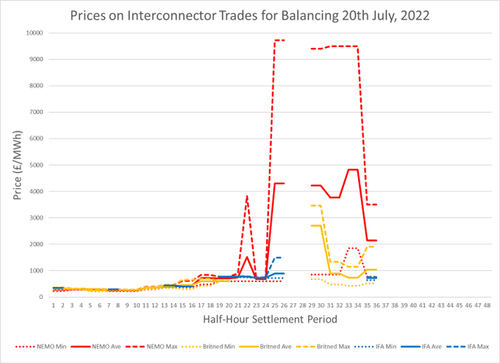London Power Prices Spike 5,000%, Relies On Belgium To Thwart Rolling Blackout
London’s power grid was pushed to the brink of failure following last week’s record-breaking heatwave.
Javier Blas, a Bloomberg Opinion columnist covering energy and commodities, said power grid disruption hit the eastern part of the British capital for a brief period on July 20 as air conditioners were turned down and spiked power demand, resulting in a bottleneck on the grid.
British utilities had trouble pulling from other power-generating sources on the grid. They relied on Belgium via undersea water cables across the English Channel to increase power supply — boosting power prices to a record high of £9,724.54 (about $11,685) per megawatt hour. This is more than 5,000% versus average power prices of £178 (about $215) per megawatt hour.
Blas said the grid crisis “quietly played out within the control room of the British electricity system.” Besides melting airport runways and buckling railroad tracks because of the extreme heat, power grid woes were rarely mentioned in the press last week. He said, “this shows the growing vulnerability of energy transportation networks — power grids and gas and oil pipelines — across much of the industrialized world after years of low investment and not-in-my-backyard opposition.”
Utilities were paying record high power prices for 60 minutes or so out of desperation to keep the grid stable and avoid large rolling blackouts.
“It was an absolute shock,” Phil Hewitt, the executive director of EnAppSys Ltd, an energy consultancy, said.
Hewitt said, “It was the price to keep the lights on. The security of supply was at stake.”
A grid spokesperson said if Belgium didn’t supply it with extra power, it would’ve been forced to “undertake demand control and disconnect homes from electricity.”
Blas blamed the grid bottleneck on aging infrastructure and underinvestment.
In a normal situation, without the traffic jams on the grid, the UK should have been able to send power to the southeast of England from elsewhere in the country — even from all the way in Scotland, where offshore wind farms are producing more than ever. The problem is that the UK, and the rest of the industrialized nations, aren’t investing enough in their grids, leaving the system exposed. -Blas
Congested power grids suggest the UK is sleepwalking into more what could be worsening blackouts. Grid troubles emerge before winter as parts of Europe have very tight natural gas storage.
Tyler Durden
Tue, 07/26/2022 – 04:15

